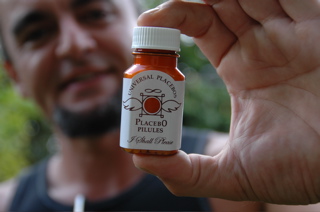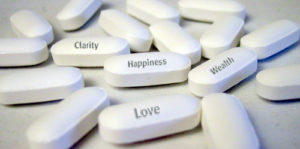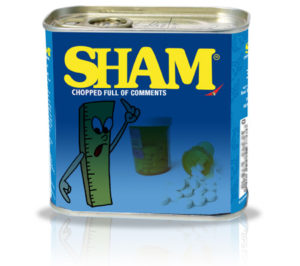A recent ‘meta-study’ claims that placebo are NOT, in fact, on par with conventional antidepressant medications, as we have reported numerous times in this blog. It seems, however, that this study should be read with certain caveats, most particularly that “The review’s authors have acknowledged that almost 80% of the studies they analysed had been funded by the pharmaceuticals industry.” (Fawning Coverage of New Antidepressants Review Masks Key Caveats) Confirmation bias, anyone?
Tag Archives: Scepticism
Why I Take Fake Pills
Here’s a fascinating story from a writer at the Smithsonian who experienced that the placebo effect is engaged even if you KNOW you’re taking a sugar pill.
“I was in grad school training as a psychotherapist,” (Kelley) told me once, “and I came across a study arguing that antidepressants work just as well as psychotherapy. I didn’t mind that so much, because I like psychotherapy and see its value. But later I found another study showing that antidepressants actually work no better than placebos, and that definitely bothered me. Did this mean that psychotherapy was nothing but a placebo? It took me quite a while to consider the reverse, that placebo is a form of psychotherapy. It’s a psychological mechanism that can be used to help people self-heal. That’s when I knew I wanted to learn more.”
It seems that here at Universal Placebos we’re selling ‘open label’ placebos, that is, placebos explicitly labeled as placebos. It’s so nice that science is catching up!
In his research, which includes a wonderful ‘one person experiment’ designed to use placebos in tackling writer’s block, the author interviews Kathryn Tayo Hall, a geneticist at Brigham and Women’s Hospital, and ‘sheepishly’ admits to the fact that placebos worked for him.
“Brilliant,” she said, and showed me a box of homeopathic pills she takes to help with pain in her arm from an old injury. “My placebo. The only thing that helps.”
“I don’t have to believe in you,” (the author says directly to his placebo pills), “because you’re going to work anyway.”
On Placebos and Depression Drugs
We note an interesting ‘counter narrative’ emerging – that is, scepticism about the commonly held view that drug treatments designed for mood disorders such as depression often engage the Placebo Effect. In this counter-narrative,
“Drug trials don’t show much in the way of classic placebo effects. The rise in placebo responses over the years is more likely due to the supportive factors in drug trials…and increasing problems with enrollment.”
The new finding—no upward trend in placebo responses—is unexpected and certain to be contested. Meanwhile, it stands as a rebuke to a popular narrative. By that account, drug effects had been hyped, expectations soared, and the inflated hopes were reflected in rising placebo response rates.”
This is fine, except the counter-narrative also resonates with challenges about the efficacy of conventional ‘gold-standard’ ‘blind’ ‘placebo controlled’ drug trials, where it has been shown that trials funded by drug companies (who by definition have a vested interest in their outcome) are 30% more likely to return ‘favourable’ results than trials which are not funded in this way. The ‘placebo effect’ might be the design and execution of the trial itself, not the actual function and efficacy of the placebo …!
Read the whole article here.
Is there scientific proof we can heal ourselves?
‘The placebo effect is a thorn in the side of the medical establishment. It’s an inconvenient truth …’
‘But I think it’s excellent news!’
So You Think You Know ‘Placebo’?
It’s rare (but becoming more common) to find the placebo effect studied as a phenomenon in its own right. This carefully considered and researched article points to several perspectives …
1. There are two processes going on, the placebo and the placebo effect.
2. Placebo effects are not caused by the object (e.g. the pill) or the procedure (e.g. an injection)
3. Much of what is considered to be placebo improvement may actually be patient report of improvement, without any actual physical improvement.
4. The patient’s inaccurate perception of a successful treatment in the therapeutic environment is also influenced by:
The natural course of the disease
Concomitant treatments
The Hawthorne effect
Regression to the mean
5. The placebo effect is not “the power of positive thinking” or belief, hope, mind over matter or the mind healing the body
Even when you KNOW you’re taking a placebo …
This research, from 2010, suggests patients benefit from the placebo effect even when told explicitly that they’re taking an ‘inert substance’
Prescribing Placebos: What Patients Think
Some fascinating recent research into the use (as in prescription) of placebos by doctors, or rather, patients’ views on this.
The research showed:
- People “were unwilling to accept at face value” that placebos can benefit patients. Instead, they discussed “in some detail” whether placebos actually have an effect or not. (Hint: They do.)
- People were pretty judgmental about those who experience placebo effects, saying things like, “I don’t think he is very bright.” In an email, Bishop says, “I think this comes from the idea that placebo effects are somehow ‘fake’ or illusory, and so someone who experiences a placebo effect has been tricked and is therefore gullible.”
- Almost all the participants believed placebos are only effective if there is deception involved. While that’s not true, most participants agreed that deceptive placebo-prescribing by doctors was unethical in most scenarios.
- One situation where people were comfortable with deceptive prescribing was when the patient is a child; the “magic kiss” was one example of giving placebos to children.
You can read more here.
Britain’s NHS should subsidise placebos?
Here’s an article from a blog called PRACTICAL ETHICS (Ethics in the News) at the University of Oxford. It’s pretty unfriendly to homeopathy, which we think isn’t quite as cut and dried a domain of practice as the author, Bennett Foddy, assumes. Brian, one of our founders, is happy to advise on both homeopathic and placebo regimes. That’s one point where we differ substantially with Foddy, and at least some of the literature does as well. Buying placebos from Boots, government subsidised or not, makes at least the ‘pleasing the practitioner’ script impossible. ("Pleasing the practitioner" is the idea that a patient’s trust in the authority of an expert induces the placebo effect.)
No fooling: ‘Placebo effect’ real

A simple sugar pill may help treat a disease — even if patients know they’re getting fake medicine.
The finding, reported online Wednesday in the journal PloS One, may point the way to wider — and more ethical — applications of the well-known “placebo effect.”
“The conventional wisdom is you need to make a patient think they’re taking a drug, you have to use deception and lies,” said lead author Ted Kaptchuk, an associate professor of medicine at Harvard Medical School. And, Kaptchuk added, it seems many doctors do this: In one report, as many as half of rheumatologists and internists surveyed said they had intentionally given patients ineffective medication in the hopes it would have a positive result.
Kaptchuk, however, wondered whether the deception was needed. When he first tried to persuade fellow researchers to explore a sort of “honest” placebo, “they said it was nuts,” he said. After all, didn’t the whole effect hinge on people believing they were getting real treatment?
Patients were easier to enlist. “People said, ‘Wow, that’s weird’ and we said, ‘Yeah, we think it might work.'”
The researchers enrolled 80 people suffering from irritable bowel syndrome, explaining the experiment while framing it positively — they called it a novel “mind-body” therapy.
Half the patients were given a bottle with the word “placebo” printed on it. The pills it held, they were told, were like sugar pills. The patients were told they didn’t even need to believe in the placebo effect, but had to take the pills twice daily.
The other half were given no treatment at all.
At the end of the three-week trial, 59 percent of the patients taking the placebo said their symptoms had been adequately relieved, far outstripping the 35 percent in the non-treatment group.
“We were all taken aback,” Kaptchuk said. “We triple-checked the data before we decided it was real.”
Read the research paper at Plos One: Placebos without Deception: A Randomized Controlled Trial in Irritable Bowel Syndrome







